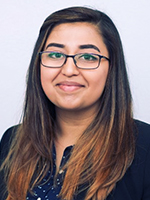Alumni

Alumni of the Master of Management of Applied Science (MMASc) program are truly international. While many go on to establish successful careers, some choose to continue their professional education in fields such as medicine and dentistry. No matter where they end up, MMASc alumni are a strong and growing network of professionals that remain connected to the program.
Where MMASc Alumni Work
Many graduates are employed in the health sciences sector and are associated with national, provincial, and regional government agencies, multinational research firms, and public and private health care agencies.
What Alumni Are Saying
Najma Aryan
 Meet Najma Aryan
Meet Najma Aryan
Complacency is not a word that appears in Najma Aryan's dictionary whether it be working two full time jobs right after graduation from Western's Masters of Management of Applied Science (MMASc) in 2016, or her truly proactive approach to building relationships in the working world, Najma gathers no moss under her feet. In fact, she credits her proactive approach to networking and job-hunting with helping her remain current in a fast-paced career in biopharmaceuticals.
To this day, even having a great position at a company, I check LinkedIn constantly. Even if you're on it once a week, it helps you better understand your own career and colleagues better," says Najma. "I have developed a habit of always looking at job boards, always having my eyes open for new opportunities, not because I'm looking to leave my current job, but because having an ear to the ground actually makes me better at my job. I always look to see what our competitors are up to, where the innovation is happening, and so forth."
Najma is currently working in marketing and business at UCB, a Belgian biopharmaceutical company focussing on neurology and immunology. After completing a BSc in biology and her MMASc at Western, Najma started working full-time at both a biologics company and a rehabilitation centre. Eventually Najma got a call from a contact at UCB with whom she had connected during her master's internship position search and decided to take up the company on its offer.
"I was a naive undergraduate student, but I learned early on that even your presence at networking events matters," says Najma. "You don't have to attend a lot to be noticed but combining steady attendance at events where you can build relationships, along with regularly updating online profiles on social media and job sites, is a great way to find the right job." A lack of career experience never daunted Najma: "I made my own business cards and attached them to my resumes, even at events where representatives wouldn't accept resumes, I would hand out cards. My cards literally only had my name and email address on them but that was enough." Najma would be the first to say how competitive the biotech field is but putting herself "out there" was her modus operandi.
Now, with the eventful world of job hunting behind her, Najma happily reflects on how the MMASc prepared her for working in a scientific company. "I loved getting a broad education because I always wanted more than one role in a company," she says. "I found the right fit at a company that gives me diverse responsibilities and is supportive of my learning." Najma stresses the importance of continual learning during her career; "having great managers or mentors is so important because they will help you grow. Mine have given me opportunities to be a leader in collaborative situations, which has been so valuable to me."
Najma's number one advice for young science graduates? "Always have an open mind, always speak up. Everyone in my company is at least ten years older than me but I never let my youth deter me from offering my insight into business issues. Everyone thinks differently and you'd be surprised how valuable you can be to a company with the skills you have now."
Harman Malhi
 Meet Harman Malhi
Meet Harman Malhi
Ask Harman Malhi what he took away from his genetics undergrad at Western and he'll tell you that at the top of a rather long list, it was scientific literacy skills that carried him a long way into the working world. "It felt odd to me that after years of burying my head in the intense world of genetics, it was what felt like a secondary skill that I've come to rely on daily," says Harman. Joining Western's very first cohort of the Master of Management of Applied Science (MMASc.) program, Harman found an environment in which he could hone his scientific communication and literacy skills while exploring how to apply them.
"My first job after graduating was with TechAlliance, a local London, Ontario innovation centre which supports tech-based entrepreneurs of all stages, from fledgling ideas to full-scale businesses." Naturally, Harman focused on the life science-based clients, often times working with researchers from within Western who were attempting to commercialize or scale up their products or tools. "I was lucky. I worked with everything, from newly synthesized polymers and enzymes to pharmaceuticals and state-of-the-art medical devices." Harman got to see, first-hand, the importance of understanding and communicating science to the public. "After all, it's not easy to bring scientific products to market!", quips Harman.
With his interests in the nexus between science and communication, perhaps it was only a matter of time before Harman was snapped up by a telecom giant; now with Bell Canada in their mobility division, Harman works on marketing analytics. "I like how my work fits into the priorities of other departments, whether it be developing marketing strategy, creative, or social media."
"The scariest part after graduation is always where to go," says Harman; "taking the time to seek advice or having an experienced mentor makes all the difference in the world. I'm also thankful that I took the time I needed to sort through the many options that lay before me before taking the leap." Even now, in the working world, Harman constantly takes stock of the professional relationships and opportunities around him before deciding on how to transition.
Relying on the communication and literacy skills he developed in university and advanced in his first few years in the working world, Harman is quick to point out that it is those same skills that have also helped him get exposure to many areas within one company. Working with clients and in government relations at TechAlliance allowed Harman to build what he calls his "working muscles" giving him competencies in a number of in-demand fields. "Dream big but don't be afraid to start small," Harman remarks "after all, that's what got me my leg up!"
Pauline Richard
 Meet Pauline Richard
Meet Pauline Richard
The concern at the top of Pauline's list when making her first career transition was one that plagues many recent graduates: "does changing jobs early on put a red flag on my CV?" Understandably, appearing unsettled to a potential employer would be a concern to any job applicant but Pauline positioned her diverse experiences in a short time span as a strength. As the new Head of Operations at biotech startup Lifebit, she sees dozens of applications weekly and intentionally seeks out applicants demonstrating agility, intensity, and quick learning.
After all, Lifebit is the third startup with which Pauline has worked. Having graduated from Western's Master of Management of Applied Science (MMASc) program in 2016, Pauline's first brush with startups was during her co-op term with Sensimat Systems, the brainchild of two Ivey MBA students. Pauline found the startup world meshed perfectly with her fast-paced working style and interdisciplinary subject interests.
Following graduation, Pauline's first job was at Cera as the Chief of Staff and Client Services for two years. Now Pauline is at Lifebit, a biotech company working to make genomic analysis accessible to the public. "I was so worried that Lifebit would think I was moving though jobs too quickly," says Pauline; "instead they saw it as an asset that I had managed to pick up a range of proficiencies."
Working simultaneously on human resources, monitoring, business development, sales, and research grants means Pauline's skillset has to be wide-ranging. "I can now see, first-hand, the advantages of being a generalist," says Pauline. "So many of my peers and I thought only of traditional science jobs after graduation, but you never realize just how many jobs there really are out there, and how many require a scientific background along with a multitude of business skills."
Perhaps the startup world was the perfect place for Pauline to cut her teeth; her interdisciplinary academic background included genetics, business administration and marketing, and professional writing. Combined, these competencies allowed Pauline a seamless entry into a working landscape demanding a balance of core technical skills and strong business and communications capacity. The breadth of her knowledge and skills also demonstrated her versatility, energy, and willingness to learn. Pauline also emphasizes the importance of building relationships in navigating the transition from graduate studies to career.
"Especially working in smaller companies, coffees and conversations make all the difference in the world," she says; "I meet executives, entrepreneurs, collaborators, and administrators in the hallways, the lunchroom, and even by the coffee machine, and it's always worth it to spend the extra few minutes engaging." It could result in new opportunities. Pauline is also quick to stress the importance of preparing a relevant pitch or a story in an environment where encounters can be intimidating or stressful "eventually it becomes second nature!"
Both Cera and Lifebit are in the lively core of London, England. Between her undergraduate degree in Genetics and her MMASc., Pauline spent a year teaching in South Korea; "nothing builds confidence like taking a leap into the wide world," she says enthusiastically. Pauline credits her international exposure in Korea with making it easier when considering international opportunities to start her career. "London (England) is a great hub for startups and so many companies are open to sponsoring internationals for a visa; they see it as a small price to pay for opening up a worldwide talent pool full of graduates with novel backgrounds," she says.
Pauline's recipe is simple: "try different things, see what you like." Collecting skills and experiences along the way, Pauline's race toward the next challenge has helped her maintain the pace needed to work with startups. Never passing up an opportunity to build relationships, or indeed have a coffee, as well as a growing international portfolio means that Pauline's exploratory methods will continue to provide her with stimulating challenges and an ever-growing skillset.

